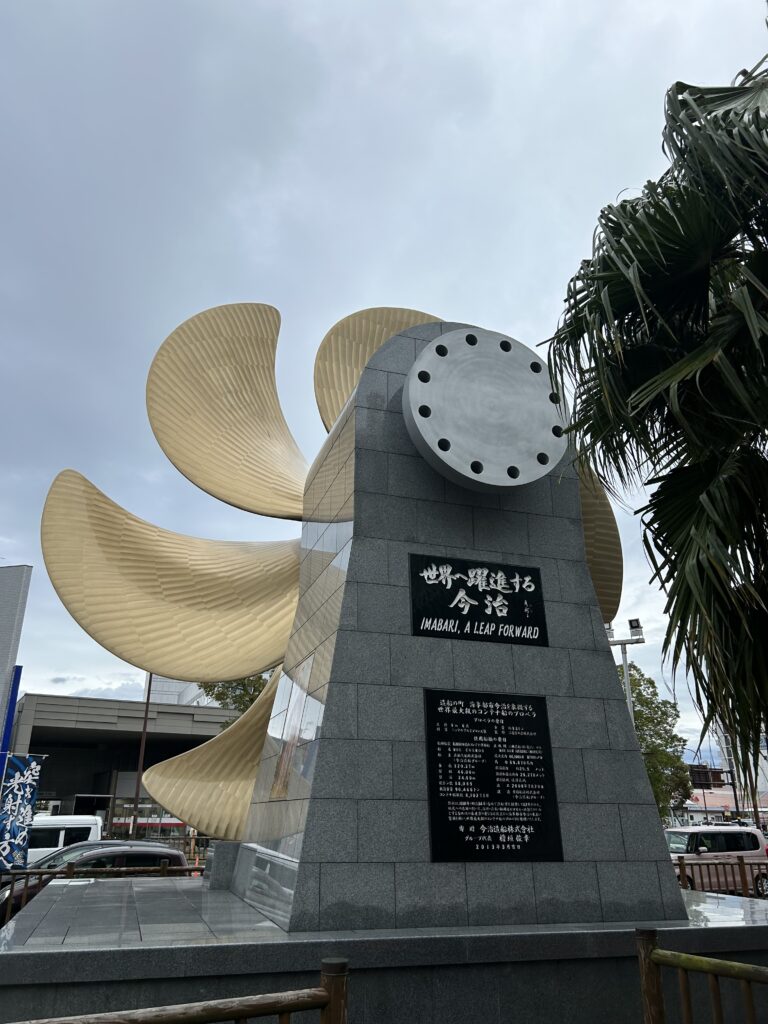(Volume 360)
Next-Generation Shipowners: Daily Progress Toward Singapore and Special Zones

Shipowner management in Japan is undergoing a transformation, necessitating groundwork for change. The next generation of shipowners must cultivate the capability to compete globally on a level playing field. This marks the future trajectory for Japanese shipowners.
■Engaging with Overseas Shipping Lines
In early December 2023, I found myself in Imabari City, Ehime Prefecture. Despite the daytime warmth, freezing rain greeted the night.
Amidst year-end festivities, an evening meeting with a Japanese shipowner set the stage. The Imabari shipowner shared insights.
“We’ve cultivated the shipping business as a family endeavor. Some shipowners used to transport salt from Shikoku to Kyushu on domestic vessels, while others welcomed married couples aboard. Over time, the business evolved into short-sea and ocean-going vessels.”
He emphasized that the current generation of shipowners, in their 70s and 80s, who have elevated Imabari to Japan’s premier shipping company, possess unique management approaches, distinct personalities, and adept negotiating skills.
The challenge of “generational change” in this industry is likened to that in others. Despite close family ties, personal relationships and characteristics are challenging to pass down.
Another founding owner countered this perception.
“They’re mistaken. The next generation is indeed learning by observing us. While character is crucial, Imabari is actively nurturing individuals with English proficiency and an international mindset, ready to compete globally. There’s no cause for concern.”
In reality, the next generation of Imabari shipowners, in their 40s and 50s, have transitioned to major shipping companies, trading houses, and overseas brokers. Fluent in English, they possess the vital skill of engaging directly with overseas shipping companies.
A modest young shipowner in his 40s, his face flushed from drink, shared his perspective.
“I belong to the generation that weathered the sharp yen appreciation post-Plaza Accord in 1985 and the emergency employment measures in 1987. Our pioneering and fighting spirit is unmatched. Nonetheless, I went abroad for training to emulate them as closely as possible,” said the young Imabari shipowner.
The landscape for Japanese shipowners has evolved.
Transitioning from the traditional era of long-term chartering by major Japanese shipping companies, the environment now sees the majority of charterers as overseas shipping companies.
To what extent can the next generation of Japanese shipowners embrace a global perspective while navigating these changes? Young shipowners continuously enhance their skills through dedicated study groups.
■Contemplating Expansion into Singapore
While the idea of expanding into Singapore holds merit, the prevailing sentiment among major shipowners is that now is not the opportune time.
A prominent shipowner unequivocally stated, “Many anticipate Japanese shipowners turning a profit in 2023, attributing it to the ongoing depreciation of the yen against the dollar, reaching 140-150 yen in the latter half of the year.”
However, the reality is more nuanced.
Only medium to large shipowners with fully depreciated existing vessels are expected to reap the benefits. For shipowners employing a sale-and-leaseback (S&LB) model, “the bottom line is actually suffering due to high U.S. dollar interest rates and reduced fixed charter rates from overseas operators,” as reported by a shipowner based in western Japan.
Despite the challenges, some mid-sized shipowners have reported increased charter revenues.
The surge in newbuilding prices presents a hurdle for placing orders, coupled with a reluctance to reduce loans for vessels still under repayment.
A medium-sized shipowner lamented, “Even if we turn a profit by selling ships, without depreciable assets, we cannot compete with foreign shipowners. This holds true even if we utilize Japan’s special depreciation system for ships. There is a substantial difference in corporate tax implications, amounting to several hundred million yen compared to foreign counterparts at the new ship ownership stage,” according to a shipowner in the Shikoku region.
Acknowledging Singapore’s high inflation and elevated costs for housing, food, and education, some Japanese shipowners find solace in leveraging Singapore’s tax system to maintain profits from ship sales. A shipowner emphasized, “There’s no rush to acquire depreciating assets amidst skyrocketing newbuilding costs or problematic S&LBs.”
Several Japanese shipowners have established ship-owning companies in Singapore as local subsidiaries. However, the prevailing sentiment among the majority of Japanese shipowners is caution.
An official from a trading company shared, “We are frequently sought for advice. Yet, given the sharp ascent in the dry cargo market and the high market prices of owned vessels, establishing a ship-owning company in Singapore at this moment, considering transfer pricing taxation, might have drawbacks.”
Nevertheless, there are increasing calls for expansion into Singapore and the creation of special economic zones in Imabari and Okinawa within shipowning clusters in western Japan.
Japanese shipowners find themselves in competition with Greek shipowners and European shipping lines. The continued maintenance of the Japanese shipping tax system, while often reiterated, may play a pivotal role in either mitigating or accelerating the “hollowing out” of Japanese shipowners.
(By the Shipowners in Japan Reporting Team)
= Published every second Monday
【国内船主の今】
(第360回)
次世代船主、日々研さん。星港進出、特区要望も
「船主経営も変わってきている。われわれがその礎をつくり、次世代の人間が世界と対等に渡り合える力をつける。それが今後の日本船主の在り方ではないか」
■海外船社と交渉
2023年12月上旬、愛媛県今治市内。冬とは思えない日中の暖かさとは裏腹に、夜は氷雨が降っていた。
年末ともあり忘年会シーズン。冒頭の発言は記者が訪問した日本船主との夜の会合のものだ。
今治船主が続ける。
「われわれは家業として船主業を発展させてきた。四国の塩を九州まで内航船で輸送、夫婦で乗船していた船主もいた。そこから近海船、外航船へと発展させてきたのだ」
今治を日本一の船主業へと築き上げた現在の70―80代の船主は、どの船主も経営方針、個性、そして粘り強い交渉力を持つと感じる。
だからこそ、他の産業と同様に「世代交代」が難しいといわれる。人脈や人柄は肉親であっても引き継げない。
別の創業者船主が話す。
「それは君の間違いだ。われわれを見て次世代の人間は何が必要か確実に学んでいる。人柄も必要だが、今後は世界と対等に渡り合える英語力、インターナショナル・マインドを持った人材がどんどん今治で育っている。何の心配もない」
実際、次世代とされる40―50代の今治船主は海運大手や商社、海外ブローカーに出向。英語も堪能だが、何より、海外船社と直接交渉する能力を持つ。
40代の若手船主が酒を飲んだ赤い顔で恥ずかしそうに話した。
「テクニックや出向経験だけでは、とても創業者には及ばない。1985年のプラザ合意後の急激な円高、緊急雇用対策(87年)を乗り越えてきてくれた世代だ。その突破力、闘争心はまねできるものではない。それでも少しでも近づくために修行で海外に行ってきた」(今治船主の若手経営者)
日本船主を取り巻く環境も様変わりした。
従来の日本の海運大手の長期用船から今では用船先の大半が海外船社という時代だ。
インターナショナル・マインドを持ちながら、次世代の日本船主はどこまで世界に挑めるか。若手船主たちは日々、勉強会を通じて日々研さんを積んでいる。
■星港進出を検討
「シンガポールに進出すべきだが、今はその時期ではない」
大手船主がきっぱりと答えた。
2023年の日本船主は年後半にかけ為替が1ドル=140―150円の円安が続いたことで「もうかった」との見方が多い。
しかし、実情はどうか。
減価償却の進んだ既存船を持つ船主は中手から大手の船主に限られる。
セール&リースバック(S&LB、売却後の再用船)で船舶を保有する船主は「むしろ米ドルの金利高、海外オペレーター(運航船社)の固定用船料の低下で収支は悪化している」(西日本に拠点を置く船主)。
それでも用船料収入が増加した中手船主は存在する。
新造船価格の高騰で発注は難しい、かといって返済ピッチの進んでいない保有船の融資を減らすのもためらわれる。
中手船主が苦しい胸の内を明かす。
「売船で利益が出たとしても、償却資産を持たなければ、海外船主と戦えない。船舶の特別償却制度を使っても同じだ。日本の法人税の下では、新造船を保有する段階で海外船主と数億円の差がついてしまう」(四国地方の船主)
シンガポールはインフレが激しく、住居費、食費、教育費は日本の4―5倍ともいわれる。「それでもシンガポールの海運政策の税制を活用して、売船益を維持すればいい。急いで高騰する新造船や悪い条件のS&LBで償却資産を探す必要もない」(前述の船主)
実際、シンガポールに船舶保有会社を現地法人として保有する日本船主は複数存在する。
しかし、今ではない、という日本船主が多数派だ。
商社関係者が話す。
「われわれも相談をよく受ける。しかし、ドライ市況が高騰局面で保有船の市場価格も高い。移転価格税制のことを考えれば、今、急いでシンガポールに船舶保有会社を設立するのはマイナス面が大きいのではないか」(船舶部)
それでも、シンガポールへの進出や、今治や沖縄での経済特区を望む声は西日本の船主集積地の至る所で聞こえてくる。
日本船主はギリシャ船主や欧州の海運と競争している。
使い古された言葉だが、このまま日本の税制が海運にも維持されれば、日本船主の「空洞化」に拍車が掛かりかねない。
(国内船主取材班)
=隔週月曜掲載